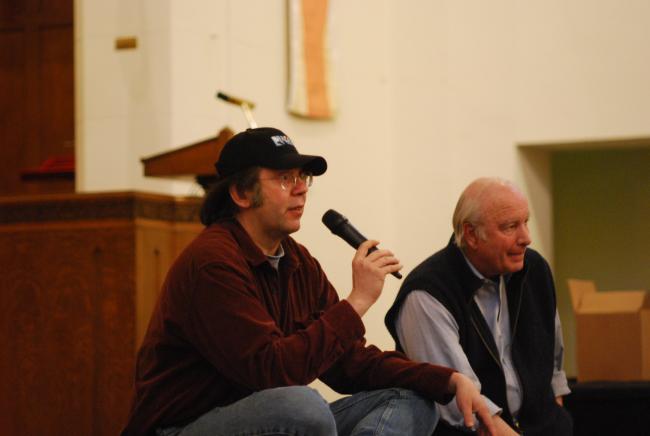Homeless advocates say community, not government, will be the solution
Tim Harris, founder of Real Change, and Craig Rennebohm, minister to the homeless, field questions about homelessness during an April 19 forum at Trinity United Methodist in Ballard.
Mon, 04/20/2009
The way to solve increasing homelessness, and it can be solved, will come through community organization and sacrifice, not through government policies or practices, according to two local homeless advocates.
Tim Harris, executive director of Real Change, and Rev. Craig Rennebohm, who has worked with people living on the streets of Seattle for more than 20 years, talked and answered questions about why homelessness is the problem that it is and what can be done about it at an April 19 forum hosted by Ballard's Trinity United Methodist Church.
Harris said members of the community need to build an infrastructure that will allow for organization across classes to help those living on the streets.
Rennebohm said Ballard needs a community organization that includes those community members who are living on the streets.
The neighborhood needs a grassroots, mobile outreach team with background in nursing, mental health and social work that can engage with those people who are most troubled, he said.
"I guess what I'm asking is to really take hold of our communities and organize block by block," Rennebohm said.
He encouraged community members who meet with resistance from neighbors to invite those people who see homelessness as strictly a police problem to encounter the human side of homelessness.
It can be difficult to encounter that human side, to interact directly with homeless individuals, Harris said. People who have been dumped on all their lives often assume their allies are dumping on them too, he said.
"One of the things we need to understand is that being homeless is traumatizing," Rennebohm said.
Harris said members of the community have to recognize the privilege and comfort zone many of them have and be willing to sacrifice that in order to work toward a solution.
During the forum, Rennebohm laid out five practices for individuals to use when relating to people who are homeless.
It's important to introduce yourself as a neighbor and interact as such, he said. Understanding that both the homeless and the homed are neighbors is the only reason necessary to get involved, he said.
The second practice is hospitality and creating a safe space.
"Until we end homelessness, there is absolutely no reason why we shouldn't have a place where everyone can get shelter and meals," Rennebohm said.
The rest of the practices involve walking side by side with the poor, listening to their stories and experiences, and accompanying them on the next steps in their journey.
Harris said the sight of human misery everyday on the street says something is wrong with the system.
"Fundamentally, homelessness isn't about screwed-up people and how do we fix that," he said. "It is about a screwed-up system that doesn't serve the people."
Though it is a systemic problem, Harris said the government can't do anything to solve homelessness because it would require an overhaul of the entire economic system. What the government does is convince voters that it is doing something about homelessness, he said.
Both Harris and Rennebohm were critical King County's 10-year plan to end homelessness, which got underway about three years ago.
The plan narrows the focus to affordable housing and services for the most-stigmatized 15 percent of people who are homeless, Harris said. Homelessness is about a lot more than affordable housing and services, he said.
He said homelessness can be reigned in through policies not directed at poverty but at creating a middle class, as was done in the wake of the Great Depression.
Harris characterized the 10-year plan as a fat guy running – "lots of visible effort, not much progress."
The forum was the first in what is planned to be a continuing series of discussions on homelessness in the community.


